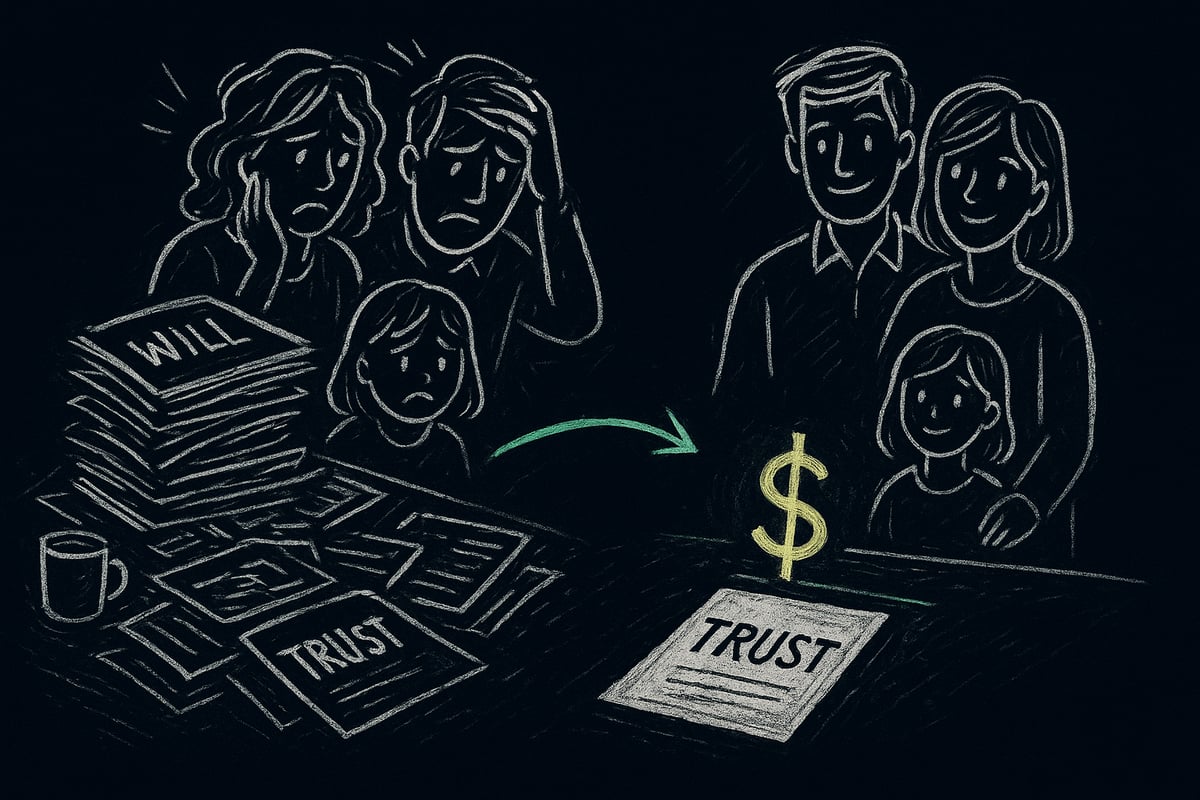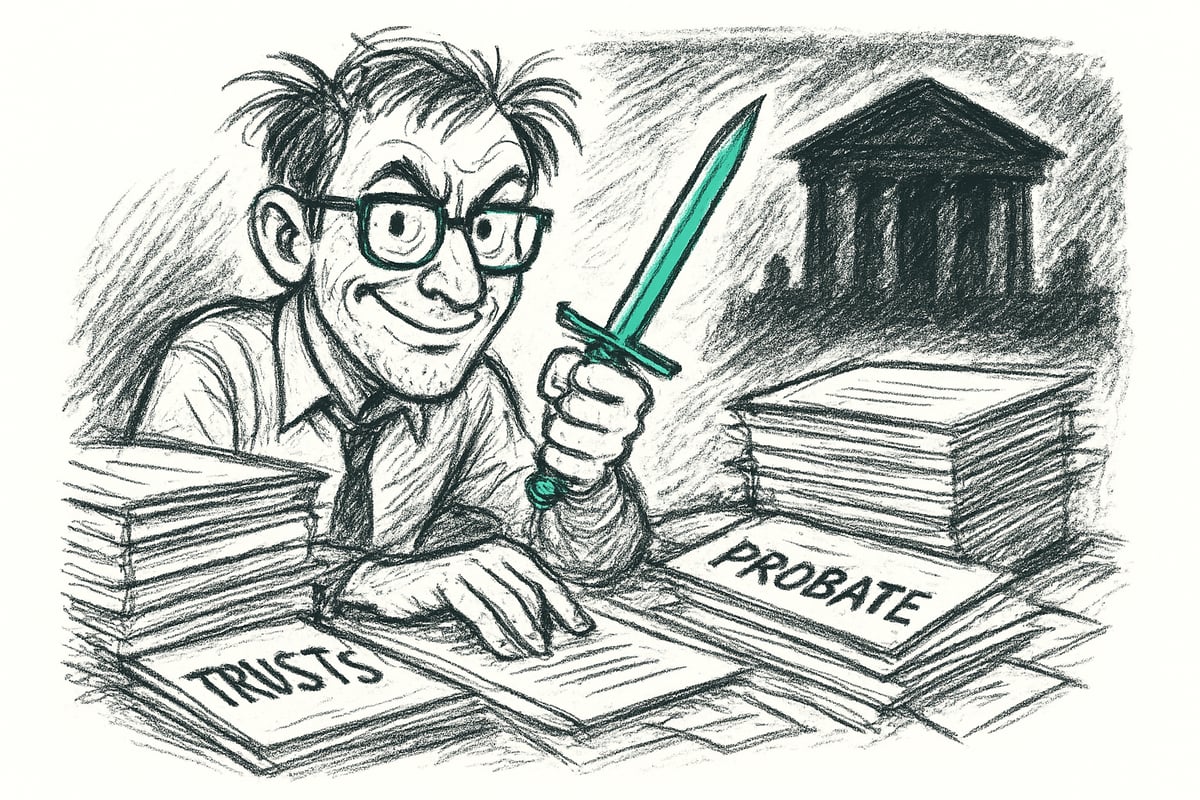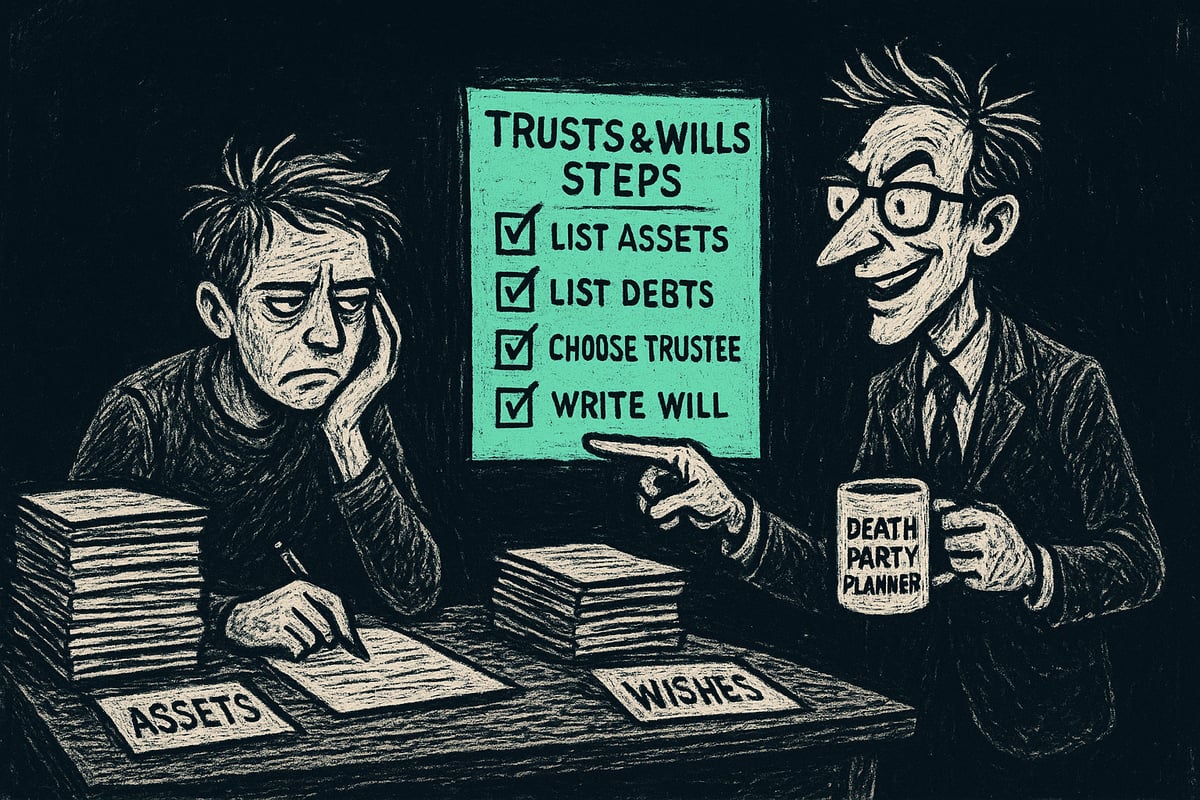Attorney for Trusts and Wills: The Essential Guide 2025

Think estate planning is just for the rich or the old? Cute. Over 60% of Americans don’t have a will, which means their families get to enjoy a front-row seat to legal mayhem when they’re gone. Spoiler: It’s not as fun as it sounds.
You’re going to die. The only question is whether you’ll leave your loved ones with clarity or a scavenger hunt. This essential guide reveals how an attorney for trusts and wills can keep your legacy—and your family—out of the courtroom circus.
Ready to dodge probate drama and make sure your ex doesn’t get your PlayStation? We’ll break down what you need to know, why legal help matters, how to pick the right pro, and what’s changing in 2025. Congratulations! You’re officially less irresponsible than you were five minutes ago.
Understanding Trusts and Wills: The Foundations of Estate Planning
You’re going to die. Sorry, but someone had to say it. Now, do you want your family to have a death party or a legal cage match? Let’s dive into the basics of estate planning, so your PlayStation doesn’t end up with your least favorite cousin.

What Are Wills and Trusts?
Let’s break it down for the over-caffeinated procrastinators: a will is your post-mortem to-do list, while a trust is more like a secret vault you set up while alive. Both decide who gets your stuff, but they work differently.
A will kicks in when you kick the bucket, naming heirs and guardians, but it goes through probate. A trust? It can skip the courtroom circus and hand assets directly to your chosen ones. Real talk: families without a will often end up in ugly court battles, while those with a trust dodge the drama.
With over $30 trillion set to transfer via estates in the coming decades, choosing the right setup isn’t just for billionaires. Even if your “estate” is a cat and a collection of vinyl, the right plan can spare your family a legal migraine. Simple needs may only require a will, but complex situations scream for more.
Why Estate Planning Matters for Everyone
Think estate planning is a rich person’s sport? Spoiler: it’s not. Over half of Americans lack any estate documents, according to the 2025 Trust & Will Estate Planning Report. If you die intestate (fancy for “no will”), your assets get tied up in probate, which can devour 3-8% of your estate and force your family into a bureaucratic soap opera.
Without an attorney for trusts and wills, expect family feuds, legal bills, and the government deciding who gets your stuff. Just ask the heirs of Prince, Aretha Franklin, or Pablo Picasso—none had a will, and their families are still untangling the mess.
The emotional toll? Massive. The financial hit? Ouch. Planning ahead is the only way to guarantee your ex doesn’t end up with your prized gaming setup. Don’t let your legacy be a cautionary tale.
Types of Trusts and Wills: Which Is Right for You?
So, what flavor of document fits your life? Here’s a taste test:
| Will Type | Trust Type | Best For |
|---|---|---|
| Simple | Revocable | Basic assets, single folks |
| Testamentary | Irrevocable | Larger estates, tax savings |
| Joint | Special Needs | Couples, dependents |
| Living | Charitable | Ongoing asset management |
Choosing the right type depends on your assets, heirs, privacy needs, and whether you want the IRS snooping around. A simple will might work if your life is as straightforward as a sitcom pilot. But if you have minor kids, a blended family, or a secret Bitcoin stash, an attorney for trusts and wills can tailor a plan that actually works.
Pros of wills? Cheap and easy. Cons? Probate headaches. Trusts cost more but keep things private and smooth. Congratulate yourself: reading this means you’re already less irresponsible than you were ten minutes ago.
The Role of an Attorney in Trusts and Wills
If you think estate planning is a DIY weekend project, you probably also think you can cut your own hair with garden shears. Spoiler: Both end in regret. The attorney for trusts and wills is your insurance against chaos, bad paperwork, and family feuds that make Thanksgiving awkward forever.

Why You Need an Attorney: Beyond DIY Solutions
Let’s be real: estate law isn’t a YouTube recipe. State rules change, tax codes mutate, and one missed signature can turn your will into expensive confetti. The attorney for trusts and wills navigates these legal minefields so you don’t accidentally leave your house to your cat (unless you mean to).
DIY estate planning sounds thrifty, but it’s a gamble. Studies show 55% of DIY wills contain errors. We’re talking missing witnesses, wrong forms, or wording so vague your cousin Larry thinks he’s entitled to your vinyl collection. The attorney for trusts and wills makes sure your documents stand up in court, not just in your Google Drive. They reduce probate hassles, minimize taxes, and ensure your final wishes don’t get lost in translation.
What Attorneys Actually Do in Estate Planning
You may picture an attorney for trusts and wills as someone who just pushes paper, but their job is way more personal. They draft and review every document, making sure your will, trust, or power of attorney is legally airtight. If your family situation is messier than a reality TV reunion, they customize solutions to fit your chaos.
Attorneys coordinate with financial advisors, accountants, and anyone else who touches your money. They also keep your plan updated when life throws curveballs—marriage, divorce, surprise baby, or that time you bought a ski chalet in Aspen. If things go sideways, an attorney for trusts and wills represents your estate in probate, making sure your ex doesn’t end up with your PlayStation.
When a Lawyer Is Essential—and When They’re Not
Some folks can get by with a basic will kit, especially if their assets fit in a shoebox and their family tree is a straight line. But if you’ve got complex assets, a blended family, a business, or heirs who argue about pizza toppings, you need an attorney for trusts and wills. Red flags include international property, special needs dependents, or an ex who loves lawsuits.
Sure, attorney fees aren’t pocket change, but compare them to the potential losses in probate. For a detailed look at what you might pay (and save), check the Estate Planning Attorney Costs Guide. Sometimes, paying a pro now means your family doesn’t pay in stress, time, or lost inheritance later.
Step-by-Step: How to Work with an Attorney for Trusts and Wills
You’re going to die. Sorry to break it to you, but your family shouldn’t have to fight over your unwashed gym socks or your secret crypto wallet. Here’s your blunt, no-nonsense roadmap to working with an attorney for trusts and wills, so you can finally be a responsible adult (for once).

Step 1: Assess Your Needs and Gather Information
First, face the music: inventory your stuff. Yes, even that collection of vintage Beanie Babies. List your assets, debts, and who gets what if you get hit by a rogue food truck.
Here’s your starter pack:
- Assets: homes, cars, bank accounts, NFTs (if you insist)
- Debts: mortgages, loans, that tab at your favorite dive bar
- Beneficiaries: family, friends, the cat, or your mortal enemy
The more honest you are now, the less likely your heirs will brawl over your PlayStation. This step sets the stage for your attorney for trusts and wills to actually help you, instead of piecing together your life from old receipts.
Step 2: Research and Select the Right Attorney
Not all attorneys are created equal. Some are wizards with complex estates, while others couldn’t spell “irrevocable trust” if you spotted them the vowels. Look for an attorney for trusts and wills who is licensed in your state, specializes in estate planning, and won’t ghost you after the first bill.
Ask these before you sign on:
- How many years have you been creating trusts and wills?
- What’s your fee structure?
- How do you handle updates after my next midlife crisis?
- Are you familiar with special cases, like business owners? (For business owners, check out Estate Planning for Business Owners for some pro tips.)
Referrals, state bar directories, and online reviews are your friends here. Don’t just pick your cousin’s neighbor’s dog’s lawyer.
Step 3: Initial Consultation and Planning
Ready for your death party planning session? Your first meeting with an attorney for trusts and wills is where you spill your guts—in a good way. Be prepared to discuss your goals, family drama, and everything you own (yes, even the embarrassing stuff).
The attorney will sniff out legal risks and opportunities. You’ll also get a clear breakdown of fees: flat rate, hourly, or retainer. If you’re lucky, they’ll skip the legalese and explain things in human terms.
This is where you start to see your procrastination pay off. You’re almost a responsible adult now.
Step 4: Drafting, Reviewing, and Finalizing Documents
Now the real magic happens. Your attorney for trusts and wills will draft documents tailored to your circus of a life. Review drafts carefully—don’t let “I leave everything to my pet goldfish” slip through.
Checklist for a smooth finish:
- Review every page (no, really)
- Make necessary revisions
- Get proper witnesses and notarization (your barista doesn’t count)
- Double check state-specific rules
| Pitfall | How to Avoid |
|---|---|
| Ambiguous language | Be specific and clear |
| Missing signatures | Follow all formalities |
| Outdated info | Update after life changes |
No one wants their will tossed out because they forgot a signature.
Step 5: Storing and Updating Your Estate Plan
Congrats! You’re slightly less irresponsible than you were 10 minutes ago. Now, store your documents somewhere safe—fireproof box, digital vault, or with your attorney.
Update your plan after major life events: marriage, divorce, new assets, or if you finally get that yacht. Most importantly, tell your executor and family where to find everything. Your legacy shouldn’t be a scavenger hunt.
Costs, Fees, and Alternatives: What to Expect in 2025
Thinking you can dodge the cost of an attorney for trusts and wills? Nice try. Death is free, but making sure your ex doesn’t get your PlayStation still costs money. Let’s talk dollars, sense, and how to avoid making your heirs hate you even more than they already do.
Attorney Fees and Typical Costs
So, how much does an attorney for trusts and wills set you back in 2025? Short answer: enough to make you wince, but not enough to justify dying intestate. Here’s the breakdown:
| Service Type | Typical Cost Range | What You Get |
|---|---|---|
| Will (Attorney) | $300 to $1,500 | Customized, legally valid, updates |
| Trust (Attorney) | $1,000 to $3,000+ | Asset protection, probate avoidance |
| Online Will | $69 to $200 | Basic, DIY, limited customization |
Factors like your estate’s complexity, your state’s laws, and your attorney’s experience all influence your bill. Oh, and don’t forget hidden gems: court filing fees, notary charges, and document storage. If you’ve got a large estate, you might want to brush up on the 2025 Estate Tax Exemption Update before you faint at the tax bill.
Probate Costs and How to Avoid Them
If you skip the attorney for trusts and wills, your estate might earn a starring role in the probate circus. Probate is the court process that “helps” your family get your stuff, usually while eating up 3 to 8 percent of your estate in fees. That’s not a typo. Probate is slow, public, and can turn your family into contestants on “Who Wants to Be a Litigant?”
Want out? Here’s how:
- Set up a living trust (skip probate)
- Use joint ownership or payable-on-death accounts
- Name beneficiaries on everything
Some people’s estates get so tangled that lawyers end up with more than the heirs. Do yourself a favor and plan ahead.
Affordable and Online Alternatives to Traditional Attorneys
Procrastinators, rejoice. The internet has made it possible to avoid that awkward office meeting with an attorney for trusts and wills. Online will and trust services are booming. They’re cheap, fast, and perfect if your estate isn’t a soap opera.
Online platforms start at $69, sometimes less. You get convenience, instant downloads, and the ability to update your docs when you remember your secret Bitcoin wallet. But, if you have a blended family, complicated assets, or a cousin who loves to sue, you’ll want the real deal.
Killswitch: Fast, Affordable Online Will Creation
Killswitch is estate planning for people who’d rather binge-watch than plan their death. For a one-time $69 fee, you get a legally valid will, unlimited free updates, and instant downloads. No attorney for trusts and wills required—just answer a few questions and you’re done before your coffee gets cold.

It’s safe, private, and perfect for straightforward estates. If you want your legacy to be more than a family feud, start planning your death party. Congrats! You’re slightly less irresponsible than you were 10 minutes ago.
Key Trends and Legal Changes in Trusts and Wills for 2025
Ready for a reality check? Estate planning is evolving faster than your favorite streaming service cancels good shows. If you think “attorney for trusts and wills” means a dusty office and a feather quill, it’s time for a 2025 update. Let’s dig up the freshest legal dirt so your legacy doesn’t get buried by outdated thinking.
Digital Estate Planning and E-Wills
Paper is so last century. Digital wills, or e-wills, are now legal in more states than you’d expect, thanks to the Uniform Electronic Wills Act and lawmakers finally realizing it isn’t 1995. Instead of hiding your will under grandma’s mattress, you can sign, store, and access your will online.
Benefits:
- Convenience: Create and update documents from your couch, pants optional.
- Accessibility: No more chasing down witnesses at awkward family gatherings.
- Less Paperwork: Save trees, and your sanity.
Cautions:
- Cybersecurity: Hackers love inheritance drama as much as they love crypto.
- Authentication: If your e-signature looks like a toddler’s doodle, good luck in court.
- Fraud Risks: Virtual doesn’t mean invincible.
| Digital Wills | Paper Wills |
|---|---|
| Fast, convenient | Traditional, slower |
| Legality depends on state | Legally accepted everywhere |
| Security risks | Risk of loss/damage |
Bottom line: If you’re thinking about skipping the “attorney for trusts and wills” and going full digital, make sure your state is on board and your passwords are stronger than your coffee.
Tax Law Updates and Their Impact on Estates
Let’s talk taxes because nothing says “death party” like the IRS sniffing around your estate. 2025 brings some spicy changes, including new federal exemption thresholds and states rewriting their own rules faster than you can say “loophole.”
If you’re using an attorney for trusts and wills, they’ll help you:
- Navigate the 2025 sunset provisions, which could slash your tax-free threshold.
- Dodge state inheritance taxes with legal gymnastics.
- Minimize tax burdens using trusts, gifting strategies, and charitable planning.
Planning tip: Don’t wait for Congress to make up its mind. If you want your nephew to inherit your comic book collection tax-free, act before the laws change again.
Diversity, Inclusion, and Changing Family Structures
Families aren’t all picket fences and 2.5 kids anymore. Blended families, unmarried partners, and LGBTQ+ couples face unique estate planning hurdles. State laws are catching up, but not fast enough for everyone.
Case in point: If you want your stepchildren or partner from that “it’s complicated” relationship to get anything, you better spell it out. Otherwise, your legacy might go to someone who still owes you money for concert tickets.
Estate plans should reflect real life, not some 1950s sitcom. Make it official, or risk your wishes being ignored by courts stuck in the past.
The Future of Legal Tech in Estate Planning
Legal tech is hotter than a probate judge’s black robe in July. AI-powered document drafting, virtual consultations, and remote notarization are making it easier (and cheaper) to plan your estate. Some platforms can draft a will faster than you can binge-watch a true crime documentary.
Trends to watch:
- AI-generated wills that spot gaps and errors before your family does.
- Secure digital vaults for instant access to all your documents.
- Remote notarization, so you can finalize your plans without leaving your couch.
Of course, even with all this tech wizardry, an attorney for trusts and wills is still essential when your situation gets messy. Automation is great, but it can’t fix family drama or outsmart tax law changes. Use the tech, but don’t skip the brains.
Let’s be real—you’re not immortal, and pretending otherwise won’t make your stuff magically organize itself when you’re gone. We’ve just walked through the chaos families face without a plan (hint: it’s expensive, messy, and your ex might end up with your PlayStation). Why leave your legacy to chance or a court clerk with a hangover? You can protect your family’s sanity and your last wishes in less time than it takes to doomscroll TikTok. Seriously, you’ve put this off long enough—time to be a responsible adult for once. Ready to roast your own procrastination? Start My Will Now
Related Articles You Should Read
What Happens If You Die Without a Will in Tennessee: 2026 Complete Guide
What Happens If You Die Without a Will in Tennessee: 2026 Complete Guide Meta Description: Dying without a will in Te...
What Happens If You Die Without a Will in Pennsylvania: 2026 Guide
What Happens If You Die Without a Will in Pennsylvania: 2026 Guide Meta Description: Die without a will in Pennsylvan...
What Happens If You Die Without a Will in New York: 2026 Complete Guide
What Happens If You Die Without a Will in New York: 2026 Complete Guide Meta Description: Die without a will in New Y...